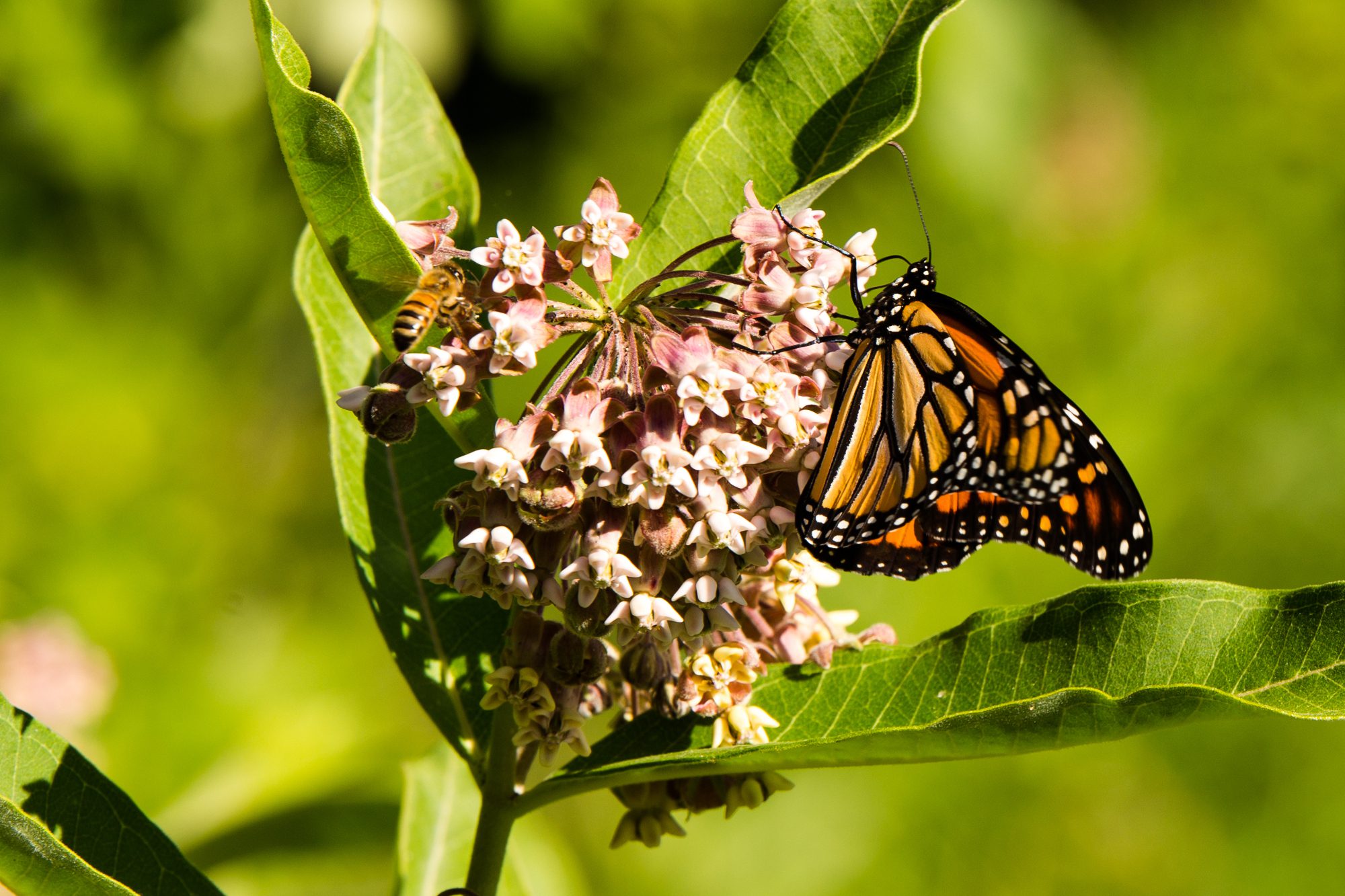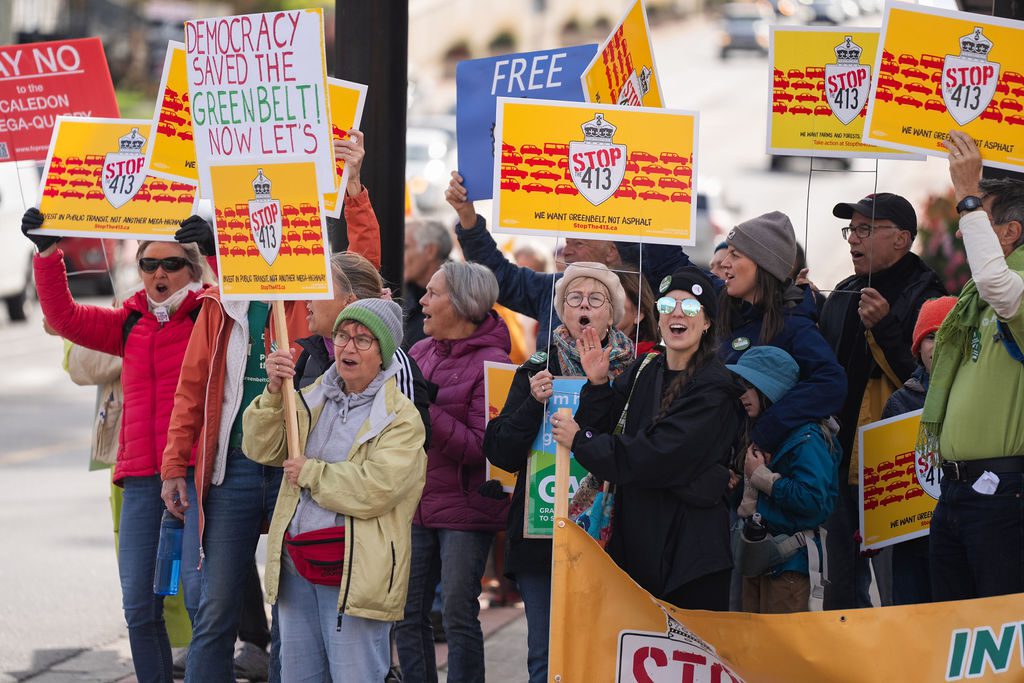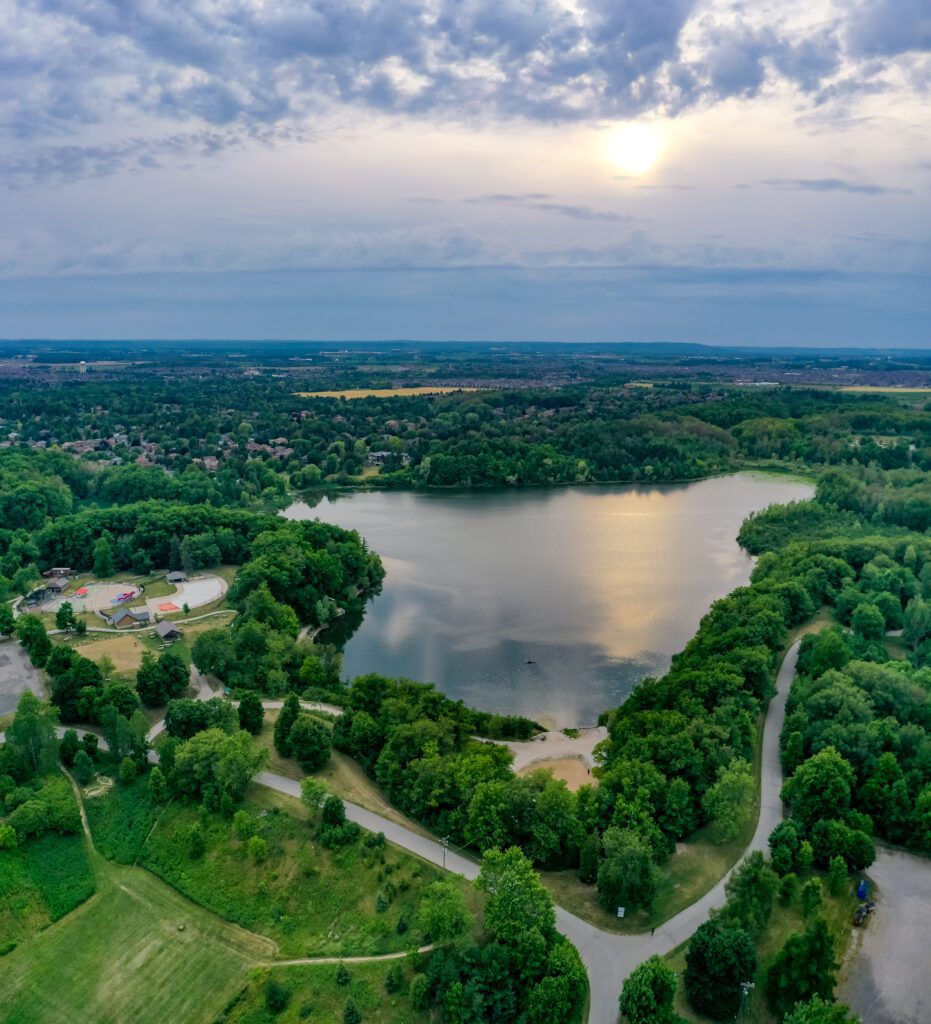For the past four years, Ontarians have witnessed an unremitting attack on the many of the laws which protect the province’s natural heritage.
The most direct and hard-to-reverse attacks have been connected to, or part of, The Big Sprawl – a concerted provincial government push to develop much of the green space Greater Golden Horseshoe (which corresponds with Ontario’s two crisis ecoregions) and permanently replace it with low-density, car-dependent residential, commercial and industrial sprawl.
The government’s aggressive push for sprawl has been accompanied by series of legislative, regulatory and policy attacks on Ontario’s environmental safety net – the set of provincial laws and policies that might otherwise have partially (though by no means completely) mitigated the worst impacts on human safety, species-at-risk, flood and landslide risk, and water pollution. For example:
- Ontario undermined Ontario’s Endangered Species Act protections in 2019 with Bill 108, which empowered the Minister broad and reckless exemptions to let developers destroy endangered species and their habitat, delay extending any protection at all for species that desperately need it, and even “pay to slay” endangered species.
- Through Bill 229, passed in late October, 2020, Ontario empowered a single partisan cabinet minister to force through dangerous development applications, even where Conservation Authorities have concluded they could cause flooding or landslides.
- Pushed forward with projects that would rapidly escalate aggregate mining in the Greenbelt, and threaten water.
Environmental Defence joined other groups in the Priorities Working Group in asking all political parties for clear commitments to reverse these changes while also fixing gaps in Ontario’s natural heritage safety net that predate the past 4 years. In particular, they were asked’
- Will your party strengthen Ontario’s Endangered Species Act and restore a science-base approach to species recovery, including mandatory habitat protection? Will you overturn the broad exemptions granted to industry under the ESA that enable industrial and development activities to destroy the habitat of at-risk species?
- Will your party restore the role of Conservation Authorities in protecting watersheds and natural systems?
- Will your party enact a moratorium on new aggregate pits and quarries while developing a strategy for reducing the need for virgin raw materials through improved aggregate recycling, new construction approaches, and avoiding construction of unnecessary new highways?
Environmental Defence also made a separate request for commitments to revoke Conservation Authorities Act permits issued under the Bill 229 regime.
Note: We have selected the relevant sections of each party’s answers. You can find all of the replies to the Priorities Group questionnaire at www.greenprsoperity.ca
Here is how Ontario’s main political parties responded:
Progressive Conservative Party of Ontario (PC)
On strengthening Ontario’s Endangered Species Act and Restoring a Science-Based Approach to Recovery
Did not answer the question.
On restoring the role of Conservation Authorities in protecting watersheds and natural systems
Did not answer the question.
On enacting a moratorium on new aggregate pits and tackling water pollution
Did not answer the question.
Ontario New Democratic Party (NDP):
On strengthening Ontario’s Endangered Species Act and Restoring a Science-Based Approach to Recovery
The Ford government weakened the Endangered Species Act, and politicized appointments to the expert scientific committees advising on species-at-risk. The Ford government also introduced unscientific “pay to slay” schemes allowing developers to destroy irreplaceable protected habitats in exchange for a fee. An NDP government would reverse these harmful changes, and ensure that Ontario’s protections for species-at-risk are based on science and the public interest, not the special interests of Doug Ford’s friends and donors.
On restoring the role of Conservation Authorities in protecting watersheds and natural systems
Yes, we will restore the role of Conservation Authorities in protecting watersheds and natural systems
Note: The Ontario New Democratic Party was one of three major Ontario political parties that vowed to swiftly restore the powers of Conservation Authorities and revoke without compensation any permits issued using the lenient and politicized new development approval routes.
On enacting a moratorium on new aggregate pits and tackling water pollution
Yes, we will fund and implement efforts to reduce pollutants like phosphorus and plastic reaching our lakes and rivers, properly controlling water takings to protect community supplies, helping municipalities get the lead out of water systems and homes, and protecting the huge intact watersheds in the far north of the province.
Regarding aggregates, aggregates are vital for building housing and infrastructure, and it is crucial that Ontario have reliable supplies of this important resource. However, Ontario currently lacks an evidence-based strategy to govern new aggregate pit and quarry approvals. In fact, Ontario already has access to more than enough aggregates under existing approvals to meet Ontario’s needs for many years to come.
Before any new approvals are issued, Ontario should develop a science-based aggregates strategy to ensure Ontario’s long-term supply while protecting farmland, groundwater and the environment — and encouraging the use of recycled aggregates. An NDP government will develop this strategy in consultation with industry and community stakeholders, Indigenous communities, municipalities, scientists and other experts.
And as mentioned, the Ontario NDP will cancel the costly and unnecessary Highway 413 and the Bradford Bypass, which threaten Ontario’s farmland and needlessly drive up the demand for aggregates.
Ontario Liberal Party (OLP):
On strengthening Ontario’s Endangered Species Act and Restoring a Science-Based Approach to Recovery
Yes, an Ontario Liberal government will strengthen Ontario’s Endangered Species Act. We are committed to adopting a science-based approach to species recovery. To do so, we will repeal the Ford government’s harmful changes to legislation related to conservation, land use planning, and endangered species..
On restoring the role of Conservation Authorities in protecting watersheds and natural systems
We’ll bring more lands under the Greenbelt’s protection in close collaboration with local and Indigenous communities and farmers and strengthen the powers of Ontario’s Conservation Authorities to provide them with the tools and resources they need to prevent flooding and protect our natural resources.
Our government will strengthen the power of Ontario’s Conservation Authorities so that they can be leaders in protecting their communities from floods and other natural disasters, preserve biodiversity and species at risk, and maintain the sanctity of green spaces, farmland, wetlands, and sources of drinking water.
Note: The Ontario Liberal Party was one of three major Ontario political parties that vowed to swiftly restore the powers of Conservation Authorities and revoke without compensation any permits issued using the lenient and politicized new development approval routes.
On enacting a moratorium on new aggregate pits and tackling water pollution
We recognize that insufficient oversight over gravel mining can create harmful impacts on our air, soil, and bodies of water. We’ll strengthen oversight and environmental protections over gravel and aggregate mining before approving new mines.
Aggregate recycling can help us reduce our dependence on new pits and quarries. Therefore, we will modernize outdated and ineffective requirements for waste management and recycling in the industrial, commercial, and institutional sector, which accounts for 60% of waste generated in the province. By streamlining waste management system in Ontario to build a waste-free province and to advance a circular economy – work that has been all but abandoned by the Ford government – we can also reduce the need for new aggregate mining sites.
An Ontario Liberal government will work closely with municipalities and Indigenous communities to protect and restore Ontario’s rivers, lakes, wetlands and watersheds – including Moose Cree First Nation and Kitchenuhmaykoosib Inninuwug.
We’ll clean up the mercury contamination in the St. Clair and English-Wabigoon River system and reduce pollution in Lake Simcoe and the Great Lakes – including lowering road salt runoff harming aquatic ecosystems.
We’ll work closely with Indigenous, federal and municipal partners to end all boil water advisories in all First Nations and Northern communities in Ontario, making necessary investments in water infrastructure, operations and maintenance where needed.
We’ll also help municipalities install microplastic filtration in drinking and wastewater systems. We will work on reducing phosphorus pollution in Lake Simcoe and the Great Lakes, and protect the Far North by continuing the work to update, fund, and implement the policy goals of the Great Lakes Protection Act, Lake Simcoe Protection Act, and the Far North Act. This important work was abandoned by the Ford government.
Green Party of Ontario (GPO):
On strengthening Ontario’s Endangered Species Act and Restoring a Science-Based Approach to Recovery
Yes. As our Roadmap shows, Ontario Greens will strengthen and enforce the Endangered Species Act. We will restore protection for endangered species and the original science-based system (Endangered Species Act, 2007) for determining species status.
We will restore mandatory habitat protection. We will overturn the Ford government’s broad exemptions that allow forestry, mining etc. to damage species and their habitat. We will ensure that economic development activities respect species’ tolerance limits for habitat disturbance. We will restore public accountability and reporting on endangered species’ status and recovery.
On restoring the role of Conservation Authorities in protecting watersheds and natural systems
Yes. As our Roadmap shows, Ontario Greens will restore powers to Conservation Authorities so these agencies can get back to doing their jobs. Protecting provincially significant wetlands and flood plains protects everyone from flooding.
Note: The Green Party of Ontario was one of three major Ontario political parties that vowed to swiftly restore the powers of Conservation Authorities and revoke without compensation any permits issued using the lenient and politicized new development approval routes.)
On enacting a moratorium on new aggregate pits and tackling water pollution
Yes. Ontario Greens will put an immediate moratorium on new and expanded gravel mines. Instead, we will encourage aggregate recycling and minimize aggregate use by improving the Building Code, stopping sprawl and building with wood.
We will immediately stop building new highways. They pave over essential wetlands and farmland and turbo-charge sprawl while making the climate and housing affordability crisis worse.
Yes. As our Roadmap shows, Ontario Greens endorse a source to tap approach to protecting water quality and quantity.
We will restore provincial funding for source water protection under the Clean Water Act, and expand drinking water source protection to northern, remote and Indigenous communities. We will properly control water takings to protect community supplies.
We will keep pollution out of water by updating and enforcing standards for major sources and pollutants, including:
- Combined sewer overflows.
- Persistent toxic substances from industry and consumers.
- Manure, fertilizers and pesticides from agriculture and cities.
- Road salt.
- Plastics, microbeads and microfibres.
- Lead.
Our $1 billion for Indigenous climate leadership, including respecting Indigenous Protected and Conserved areas, will help Indigenous communities to protect the huge intact watersheds in the far north.
Check out our other Election Issue Guides on the Big Sprawl and on Climate Change.








